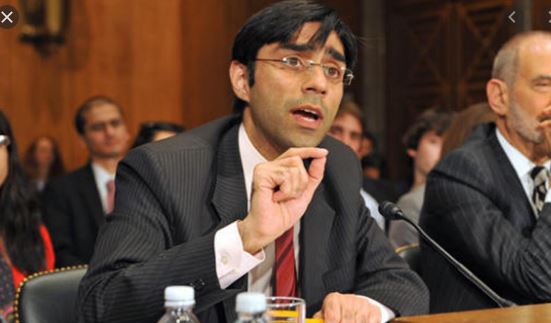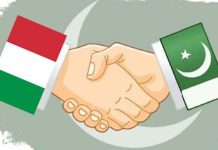DNA
ISLAMABAD, DEC 16 (DNA) – Moeed Yusuf, National Security Advisor to Prime Minister, said economic security, connectivity, regional peace and developmental partnerships are strong bases for our economy. That’s why, we want peace in Afghanistan to have connectivity with Central Asia and beyond. “We are also open to east and west but unfortunately our eastern neighbour undermines Pakistan and continue to oppress the people of occupied Kashmir.”
He was speaking at a plenary titled: Economic Outreach Initiatives and Non-Traditional Security Threats Facing Pakistan at the 23rd Sustainable Development Conference organized by Sustainable Development Policy Institute (SDPI) here on Wednesday.
“Today the government is not taking developmental assistance, but we are talking about developmental partnership as part of our goal. Our dream for Pakistan is to become the melting pot for global economic interests. We are not in favour of providing military bases anymore, but ready to provide economic bases to the world to use Pakistan as a hub of interdependences.”
Dr Moeed said the future of Pakistan lies on economic diplomacy and outreach to the world. Economic stability cannot come at the cost of military security and human security. The challenge is too big to overcome and needs a broader national response.
About Pak-US relations, he said that we need to change the mode of conversation with the US. Mostly we focus on Afghanistan and aid when in conversation with the US, whereas we need to discuss development partnerships and economic stability.
Speaking at a session in the morning on Access to Healthcare and Competition, Dr Joseph Wilson, the former chairman of Competition Commission of Pakistan, discussed about the Constitution of Pakistan which ensures healthcare facilities as well as compulsory licensing.
Pradeep S Mehta from CUTS International India called upon the global civil society to take lead in pressing for a second version of the Doha Declaration on TRIPs and Public Health in order to deal with the emergency after the rejection of a proposal on waiver of IPRs on COVID-19 vaccine in the recent WTO TRIPs council meeting.
Teresa Moreira from UNCTAD debated the competition and consumer policies for the efficient working of health care markets the worldwide. This will provide affordable healthcare by restoring competition.
Allan Asher of FEMAG, Australia pointed out that incorporating ‘TRIPs Flexibilities’ may not be effective in the present-day world with plethora of ‘TRIPs-Plus’ bilateral trade agreements, which can hinder access to the relevant know-how at affordable costs.
Hardin Ratshisusu of South African Competition Commission shared the case study of South Africa countries and their Intellectual Property Policy (2018) to protect public health.
Speaking at session on Tobacco Greenwashing: Misinformation / Disinformation in the Times of COVID-19, Dr Nausheen Hamid, Parliamentary Secretary Health, said saving life in this pandemic is not only doctor’s job, but it is the duty of every citizen.
Khurram Hashmi, Coalition for Tobacco Control, said provision of health care is a challenge for Pakistan, as vaccines are being introduced but there is no clear picture of the situation. Various studies have depicted the relation between COVID and smoking as it affects lungs directly, but governments have no control over tobacco industry, which influence policy regulators by funding environmental projects.
Waseem Iftikhar Janjua from SDPI said that 32.4 MT of tobacco crop produces 6.48 MT dry tobacco which causes huge depletion of water and fossil fuel. He demanded a comprehensive tobacco control policy that should be devised without tobacco industry interference.
Nadeem Iqbal, CEO, NCRP, Pakistan said our dilemma is that the government is promoting prevention from tobacco and tobacco-based products and Pakistan Tobacco Board charges Rs3/kg on tobacco.
Speaking at a session on ‘Climate induced migrations in times of COIVD-19: A case of south Asian countries’, Minister of State for Climate Change Zartaj Gul said that both climate-induced migrants and refugees are living in Pakistan. She said sudden and gradual migration is a rising issue at urban level, but instead of holding discussions there is a need to take practical steps to address the issue. The Minister suggested that SAARC should add the issue of climate induced migration on their agenda.
Harjeet Singh, Global Climate Lead, said that 25 million displacements were recorded in 2019 and the number is increasing. He warned that out of all these displacements, one third falls only in South Asia. However, good news is that the UN has recognized the term displacement and migration. Sanjay Vashist, Director CANSA, India said the random migration won’t help in increasing human resilience. Raana Rahim, ICMPD, Pakistan said that the topic of climate-induced migration has become important for research, as researchers argue that these displacements are temporary.
Speaking at a session on the Role of Regional Cooperation for Asia-Pacific’s Energy Transition in the COVID-19 Era, Milou Beerepoot (Regional Energy & CCM Specialist, UNDP, Regional Office, Bangkok said that sustainable development is not possible without sustainable energy and without regional collaboration through technological interventions. She said the concept of shifting great economy to green economy will ultimately help in job creation specifically in the times of pandemic.
Michael Williamson, Section Chief, Energy Division, UNESCAP, Bangkok pointed out that emissions have reduced due to COVID-19 because of less economic interventions and now there is a need to improve the decoupling phenomena for decarbonization and promotion of better environment.
Zheng Baihua, Director-General, Development Bureau, GEIDCO, China suggested the enhancement of synergies in development and plans for the renewable energies which will ultimately promote the implementation of key projects in this regard.
Dr Michael Jakob, Senior Researcher, Mercator Research Institute, Berlin, Germany and Dr Hina Aslam from SDPI highlighted the economic perspective in COVID time and highlighted that carbon pricing can increase the tax base and ultimately impact on the low- and medium-income countries.
Ahsan Javed, Research Fellow, Renewable Energy, SAARC Energy Center, Islamabad emphasized on exchange of knowledge, enforcement of rules and regulations and capacity building of states as key aspects for the regional cooperation.
Speaking at a session titled: Finding the Way Forward in Post-COVID-19 Pakistan with the Doing Good Index, Dr Waqar Masood Khan, Special Assistant to the Prime minister on Revenue, said that this is not the first time that country is hit by the crises; the government is happy to see the assistance provided by philanthropy organizations during the pandemic.
Mehvesh Mumtaz, Director Research, Centre for Asian Philanthropy and Society, Hong Kong said that the world is suffering , but the good news of vaccine is still a far cry.
Ahmed Chinoy, ex-chairman of Cloth Merchant Association, Karachi said that 60% white collar and middle-class people who were in dire need to help during pandemic were provided no relief even in the form subsidy in bills and medicines
Muazzam Arsian Bhatti, Alfzoe Technologies, Islamabad suggested that corporate sector should be linked and engaged in corporate social responsibility.
Speaking at session titled: Cultural and Knowledge Partnerships through Museums, Sayed Zulfiqar Bukhari, Special Assistant to Prime Minister on Overseas Pakistanis, and Chairman of Pakistan Tourism Development Corporation, highlighting the impact of COVID-19 on Cultural and Knowledge through Museum said that the sector has been neglected since years. PTDC operating gusthouses and marking, branding and making the business. he said, adding that commercialization of old properties to private sector is under consideration.
We are planning the branding of Lahore and Taxila museums, he said, adding that we have moved a summary to make this sector more archaeological, less bureaucratic, and more cultural.
Qasim Jafri, Goethe Institute Lahore, said we have a domestic tourism to start with. “We are sitting on a treasure of civilization on which we need to work upon. We need not to destroy our natural environment in case of future development.”
Dr Karen Exell, UCL, Qatar talking about the regional development of Pakistani museum as a change maker said that both Lahore and Taxila museums have a great potential but there is a lack of professionalism in the administration of Pakistani museums
Dr Nadhra Shahbaz Naeem Khan from LUMS, Lahore said that we are not making these museums into cultural hubs but just stores.
A day earlier, speaking at a plenary titled: COVID-19 Challenges for SDGs and Human Development, Dr Ishrat Hussain, Advisor to the Prime Minister on Institutional Reforms and Austerity, said climate change, digital divide, multi-dimensional inequality and disruption of the integrated supply chain systems are the biggest threats in the way of SDGs. SDGs canot be achieved unless a more inclusive international involvement, not only from the governments but also from the private sector and civil society organizations is sought.
At the regional level, Dr Ishrat said, cooperation with regard to efficient use of depleting water resources is the need of hour. “This will mitigate the risk of food, water and energy in the region on the one hand and help create livelihood opportunities on the other.”
On the national level, he said, the government is taking the institutional reforms agenda very seriously with focus on structural issues, including trade imbalance, revenue mobilization, skills and technology development, agriculture efficiency and public sector reforms.
Dr Ishrat said he understands that reform measures require a vision and patience and if this vision continues, he is optimistic that Pakistan will resolve these issues.

















